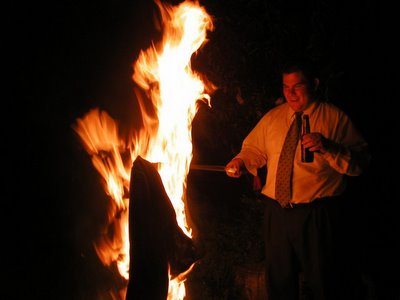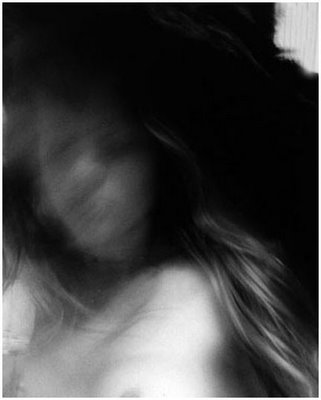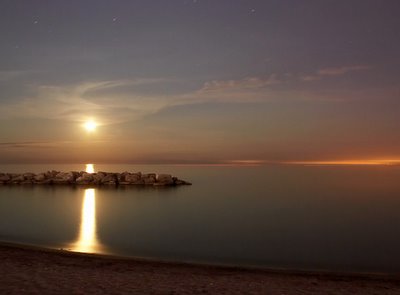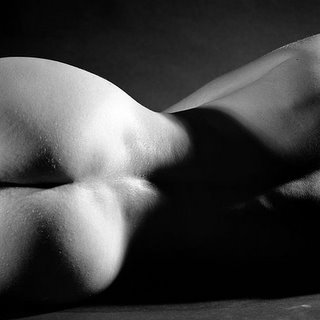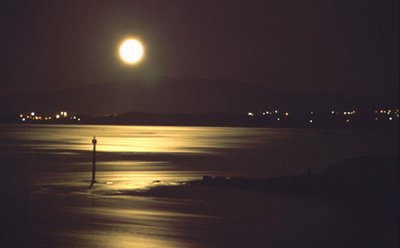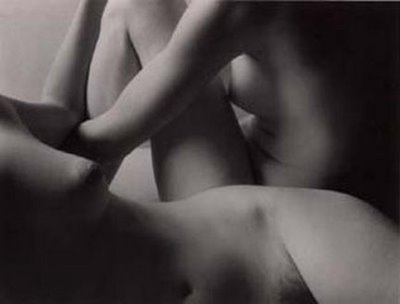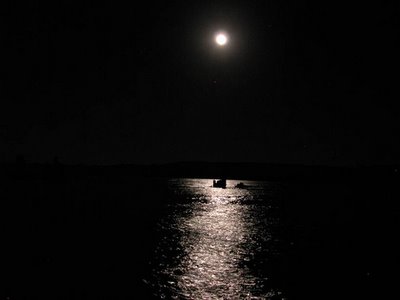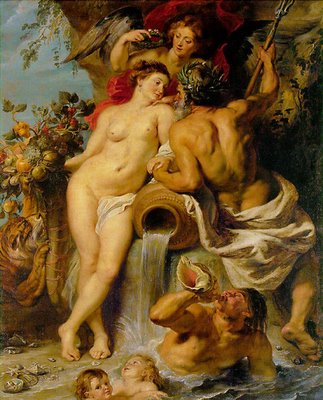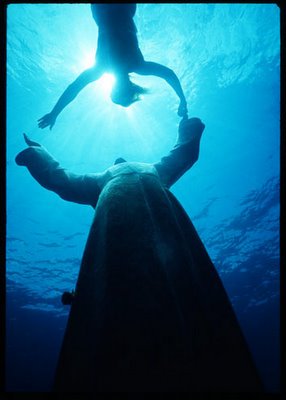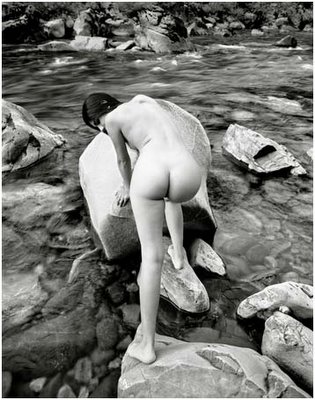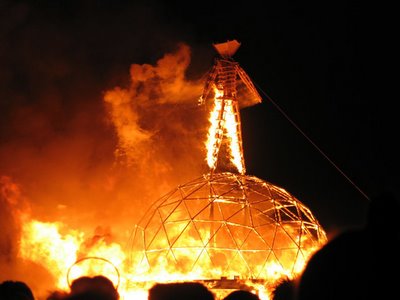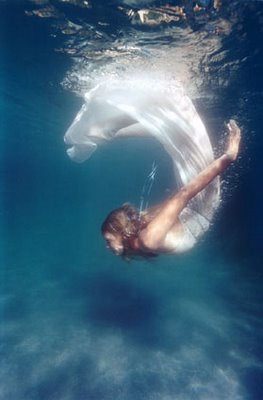Spirit of the Night
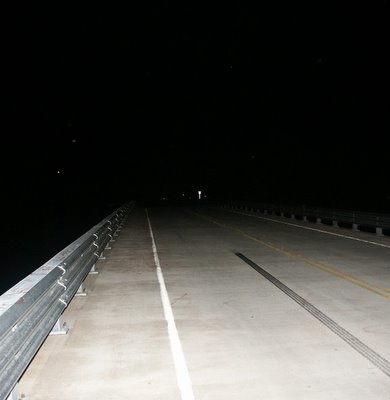
According to some Parisoto shamans, power comes to them from the “spirit of the night.” This spirit “is everywhere. It has no name. There is no word for it.” The eagle and the owl are only the messengers that bring instruction from the spirit of the night. “Water-babies” or some other animal can also be its messengers. “At the time that the spirit of the night gives power for doctoring,” it tells shamans to ask for help from “the water-babies, eagle, owl, deer, antelope, bear or some other animal.” The spirits that confer power are invisible; only shamans can perceive them.
-- Eliade, Shamanism: Archaic Techniques of Ecstasy
***
TWO FIGURES IN DENSE VIOLET NIGHT
Wallace Stevens
I had as lief be embraced by the porter at the hotel
As to get no more from the moonlight
Than your moist hand.
Be the voice of night and Florida in my ear.
Use dusky words and dusky images.
Darken your speech.
Speak, even, as if I did not hear you speaking,
But spoke for you perfectly in my thoughts,
Conceiving words,
As the night conceives sea-sounds in silence,
And out of their droning sibilants makes
A serenade.
Say, puerile, that buzzards crouch on the ridge-pole
And sleep with one eye watching the stars & all
Below Key West.
Say that the palms are clear in a total blue,
Are clear and are obscure; that it is night;
That the moon shines.
***
THE SPIRIT OF THE NIGHT
Feb. 8, 2006
I sit myself here where the spirit of the night is thickest,
not so much a fog as the heart’s darkest moisture dreaming
the deep world’s exhalations. I am the outward lung of that
atmosphere, and my words capillary pure dark nourishment,
gilling noctal seas. The spirit of the night wings to me astride
a huge white owl skimming the trees outside, her eyes patient
as the moon’s, plucking rats and snakes from their perches
& ripping scarlet wounds so wide I might not survive the
writing of them. The spirit of the night informs this work
exactly where I fail to adequately sustain it, alive most
where no living familiar for more than one hour can claim it.
A dense cold night came to me up from a blackened sea,
half-fish, half-woman, maned with a hard surf’s roaring
susurrations, loined with a black womb’s delvings,
demanding of my words a mad enough refrain, dark saddle,
if you will, from which to proclaim the spirit of the night’s dominion
over all dark shores, all deep sounds where days are drowned.
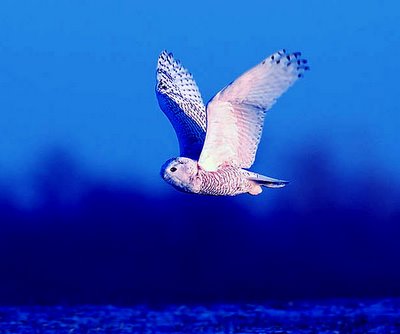
Almost all animals can become spirits, as can a large number of objects -- anything that has relation to death (e.g. graves, bones, teeth, etc.) and any natural phenomenon (blue sky, east, west, etc.) . But here, as in many other cases, we tough upon a magico-religious experience that extend beyond the sphere of shamanism, for warriors, too, have their guardian spirits, in their armor and in wild beasts, hunters collected their guardian spirits from the water, the mountains, the animals they hunt, and so on.
-- Eliade, ibid
WHERE LOVERS MEET
1978
There was an evening, once,
Long before the summer’s end,
When we sat by the river
Eating grapes and cheese,
Smoking hash at sunset.
You were talking,
But all I heard were whispers
From the swirling falls,
Climbing up the devoured cliffs,
Spraying mist on our faces
Like a blessing--
we will meet again
in that water
water
wine
water
we will meet again
in the age of summer
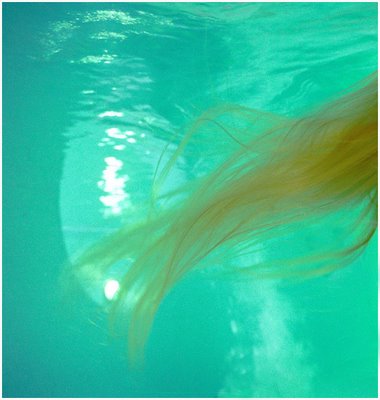
TEAR IT DOWN
Jack Gilbert
We find out the heart only by dismantling what
the heart knows. By redefining the morning,
we find a morning that comes just after darkness.
We can break through marriage into marriage.
By insisting on love we spoil it, get beyond
affection and wade mouth-deep into love.
We must unlearn the constellations to see the stars.
But going back toward childhood will not help.
The village is not better than Pittsburgh.
Only Pittsburgh is more than Pittsburgh.
Rome is better than Rome in the same way the sound
of raccoon tongues licking the inside walls
of the garbage tub is more than the stir
of them in the muck of the garbage. Love is not
enough. We die and are put into the earth forever.
We should insist while there is still time. We must
eat through the wildness of her sweet body already
in our bed to reach the body within that body.
***
THIRD CUP
2001
It doesn’t matter if you’re
looking for God or true wilderness
or the insides of your love:
you’ve got to search
at least three ways.
Query the same engine
and the same pages result.
First you rowed forth seeking
island to island the
descending rooms of a vault,
finding Orpheus astride
gray fishes and a sea god’s
house ribbed with whalebones.
Then you entered the forest
of your desire where it
was darkest, with only
your red hunger to
light the way. Now it’s
time to take the guided path
back from annihilation,
returning to the world
a simple boon. That chalice
that you found out there
heals itself returning
to the lips of those who
need it most. Actually,
the third way isn’t a
search at all: rather we translate
what we found in letting go,
filling the page with
loaves and fishes
from heaven’s deep.
***
BUILDING A BETTER BRIDGE
Feb. 9, 2006
It's taken a long time to sooth
just what all those blue remits
were valving, what heart was
so primed for exulting under
the known catalogue of exalts.
Years to triangulate down through
flesh and sea and words
to see that my falling in love
with a woman who stepped
from a dream’s river and
then faded all too soon
back into it was so exactly
like the phosphor of late
moonlight in my aging
bedroom’s coursings, so
much so that the river
stepped back into the woman
and delight became both figure
and ground of a delighted imago’s
traceries, the augment
of all we love to lose
and lose by loving.
It wasn’t the falling in love
those few-too-nights in
which her Yes met mine
in two bodies’ cascade
down the merry falls
of white erasure; it wasn’t
the drift that single hour
before first light in which
I was never singular again,
having lost all surface
semblance of I to Thy;
nor was it the swooned
autumn which always followed
where I walked enormous
windy forests of cathedral
pines in God’s gold
grieving light, more alone and
more full of world than ever;
it wasn’t the boozed winter
of absentia where I searched
down every shelf of naught,
nor was it the brutal
spring which ripped
out of frozen silence,
mocking my dearths
with virile blooms of orange;
it wasn’t all the sexual
marauding where each
melange no matter how
devoid of what I once
found holy still had in
its plush undercarriage
enough silk ocean
motion to milk the ache
upon a bedded shore
where infinite regressions
crashed an ebbing heart
of hearts. It’s taken all these
years recalling all those
years to drill down through
the blue of a once-and
ever divine float to get
down and through to
exactly what it moats,
a dark bourne of blue
embrace which isn’t
blue at all, nor from any
living woman born, though
through those wombs
are surely how I got here.
A lover’s lover’s lover
is a thrall thrice said
to charm blue’s widdershins,
cashiering strange wild cables
to build a better bridge,
to name the aptest plunge
for my life’s descending lines.
I here ensoul the rapture
of those old departing nights
in which a joy hauled me
over wild blue walls;
only the remembered
deep-sea motions of
those pealing falls remain,
their oil an ink, if you will,
pure praise, blue salts
enough to sea all days.
Oh lady of my dream’s
pure cyan, I remain to baritone
your lost bridge’s song.
Perhaps one day you’ll hear it
on your pillow far away
like musing rising from
the end of every fallen stone,
and smile for me just one,
that curvature span enough
to cross this choiring sea.
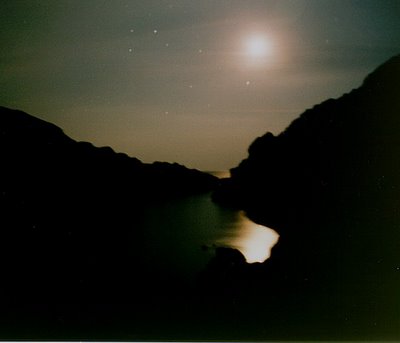
LONGING
Summer 2002
I sometimes wonder whether longing
can’t radiate out from someone so
powerfully, like a storm, that nothing
can come to him from the opposite
direction. Perhaps William Blake
has somewhere drawn that?
— Rilke, letter, 1912
There is a longing in us which
grows from sigh to starry shriek.
Perhaps comets are charred furies
of that pain, a whirl of frozen fire
which ghostlike tears to God’s porch
and back, insatiable and unanswered.
Perhaps. All I know is that
it’s infinitely perilous to think
that longing has a human end.
In my cups I once believed
a woman mooned for me,
her longing a white welcome
over my million nights alone.
I met and passed her many times
those hard years, blinded by the aura
of her unvowled name.
Surely when two longings touch
it’s like when great waves collide,
the wild sea witched flat.
Our deeper thirst can never sate:
as each draught of booze
was never enough, so each
embrace tides a milkier door.
I recall a young man
walking home drunk on a
frozen night long ago,
his beloved nowhere
to be found in the chalice
he had named. Winds hurled
steel axes through the
Western sky, failing to clear
the cruel foliage of fate.
In his defeat he was greater
than any angel beckoned
by that night: his heart so
hollowed by longing
as to chance in pure cathedral,
her absence the clabber of a bell
shattering the frozen air,
trebling the moon
without troubling a sound.
***
DESIRE
Aching stars:
this hopeless longing
for the forever-withheld,
miasmically-waylaid clench
of all you offered in one glance.
Arrival and departure
the same portal.
Desire a wild
gallop through fields
of strawberry wheat
in early autumn,
riding harder toward
your absence.
There it pulses,
beacon to strange
and reckless waters,
open wide and forever
deaf to consequence,
shining faintly on
the next door, the next room,
the next blue bed where you
in all your faces wait,
out beyond the breakers
of any moon-struck beach,
dangerous and darker
and wilder than
this heart has ever
dreamt. But will.
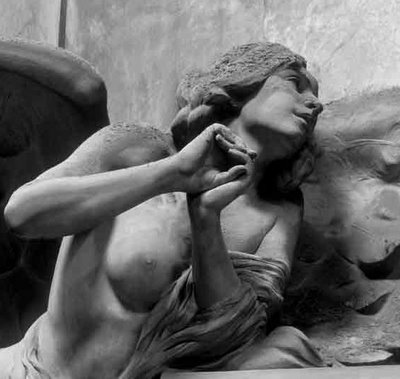
NIGHT
2004
It comes to this shore, the end of days
Which launched so bright and eager and
Full of this bow-spent, ebbing breeze.
Light here now turns gold, then cooler,
Dimming down to a horizon’s pink,
Folding wings to blue. There is a
Shape to this shadowing, a cape
Of black with exquisite folds of
Exalt cobalt blue -- auguries
Perhaps of that distant hour which
Starts the world again. For now, words
Are stained to the knees, the waist of
A tide which flows dark and rich and
wild. The bright lock hangs, now broken.
The lid stirs; a black eye swings open.
***
SONNET TO ORPHEUS 2.29
Ranier Maria Rilke
transl. Stephen Mitchell
Silent friend of many distances, feel
how your breath enlarges all of space.
Let your presence ring out like a bell
into the night. What feeds upon your face
grows mighty from the nourishment thus offered.
Move through transformation, out and in.
What is the deepest loss you have suffered?
If drinking is bitter, change yourself to wine.
In this immeasurable darkness, be the power
that rounds your sense in their magic ring,
the sense of their mysterious encounter.
And if the earthly no longer knows your name,
whisper to the silent earth: I’m flowing.
To the flashing water say: I am.

